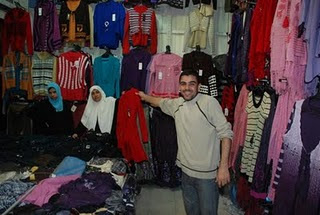AlertNet content however, is often highly politicized and hundreds of NGOs are provided free and unfettered publishing rights on the site. Reuters publishes its own stories here which ostensibly carry a humanitarian theme but frequently suffer from the same partisanship and systematic bias we identify in stories appearing on Reuters' main websites.aims to keep relief professionals and the wider public up-to-date on humanitarian crises around the globe.
In a story with material drawn from an op-ed appearing in the International Herald Tribune, Reuters reports on comments by Irish Foreign Minister Micheal Martin about the situation in the Gaza strip following the war there last year:
Reuters commits a serious error of omission by failing to report that the "blockade" (actually a misnomer as thousands of tons of foodstuffs, fuel, medical supplies, and other humanitarian materials pass into Gaza weekly) is not one exercised by Israel alone, but also by Egypt. By ignoring the Egyptian role in the selective embargo of, for example, metal products which can readily be adapted to war materiel (also not mentioned in the story), Reuters is perpetuating the pernicious myth that Israel is solely responsible for the dearth of certain building materials in Gaza.Ireland's foreign minister on Friday called the Israeli blockade of Palestinian-ruled Gaza inhumane and unacceptable and he urged the European Union and other countries to increase pressure on Israel to end it.
Moreover, while Reuters is quick to quote Martin's characterization of the situation in Gaza as a "humanitarian crisis", the news agency fails to provide any balancing perspective. For example, UN Middle East Envoy, Robert Serry, who visited Gaza just three weeks ago, declared:
There is no humanitarian problem in Gaza.


No comments:
Post a Comment